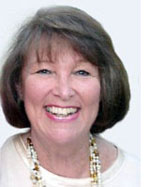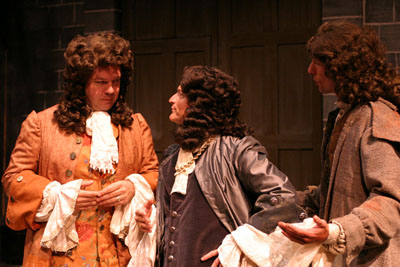|
By Cynthia Citron
 LOS ANGELES—Spoiler alert: In Itamar Moses’ brilliant intellectual farce, Bach at Leipzig, Bach does not appear. But his music does! LOS ANGELES—Spoiler alert: In Itamar Moses’ brilliant intellectual farce, Bach at Leipzig, Bach does not appear. But his music does!
Set in 1722, Moses’ witty comedy is based on an actual event: the gathering of eight of the major organists of the time in a competition to succeed the recently deceased organ master of Leipzig’s prestigious Thomaskirche (St. Thomas’ Lutheran Church), Johann Kuhnau. Here Moses’ playful insanity begins: all the competitors are named Johann, Georg, or Friedrich---or Johann Friedrich, Georg Friedrich, Johann Martin, Johann Cristoph, Georg Balthasar, or Georg Phillip. Plus the late entry, who is heard but not seen, Johann Sebastian.
Mad as it seems, these were the actual names, but Moses compounds the confusion by having them address each other sometimes by their first names, sometimes by their middle names (anyone who was anybody in those days had three formidable names), and sometimes by their last names. Which is okay when they’re all onstage together and addressing each other directly, but when any two are conspiring against the others, you need a scorecard to keep track of who is which.
First there is Johann Friedrich Fasch (Rob Nagle), one-time pupil and protégé of the late Kuhnau. Then Georg Balthasar Schott (Joel Polis), organ master at the decidedly second-rate Neue Kirche, angry and hostile, and still smarting from having been repeatedly rejected from the music school that Kuhnau ran. And Johann Martin Steindorff (Henry Clarke), a gilded dandy with father issues, Georg Friedrich Kaufmann (Leland Crooke), a befuddled old gentleman who mistakes all the goings-on for scenes from an upcoming play, and Johann Christoph Graupner (Bill Brochtrup, forever recognizable as the gay receptionist of “NYPD Blue”), who arrives majestically to claim the job. There is also a grifter organist, Georg Lenck, too poor and insignificant to have a middle name, played by Dominic Conti.
And finally, arriving in an ominous red glow, as if from the mouth of Hell, the “judge” of the auditions, Georg Phillip Telemann (Michael Cavanaugh).
Exquisitely dressed in some of the most gorgeous costumes designer A. Jeffrey Schoenberg has ever produced, and meticulously directed by Darin Anthony, the intensely earnest competitors engage each other with profound treatises on the state of the religious conflicts prevalent at the time (Lutherans vs, Calvinists), the nature of destiny and inevitability, and the prime motif that “there is no joy without God.” They also express their inflated opinions of their own culture: “German culture is all that distinguishes us from the animals,” says one. “No, from the English,” responds another. And in another
Go to the top of right column
|
|

exchange Georg Balthasar Schott exclaims, “We are not meant to experience pure feeling…this is not Italy!”
The comedy is broad: the grandiose Graupner acknowledges, “Many people think they’ve heard of me,” and when he is approached by Schott who confides, “I was hoping to have a word with you,” Graupner replies, “Cantankerous!” And there is a hilarious soliloquy in which the bemused Kaufmann explains a philosophical concept at great length to the bewildered Fasch, who doesn’t get it. And neither does the audience.
Fasch also has a wonderful soliloquy in which he explains, by letter to his wife, the intricacies of composing a five-voice fugue, which is illustrated by chords from an offstage organ. It is a delicately rendered lesson which winds up with the admonition that the ending must be “surprising, but inevitable.” As with all the many correspondences in this play, this letter to his wife is delivered by carrier pigeon.
There is much tomfoolery, many subplots, sight gags, and constant chicanery as the competitors try to overcome the competition, and the farcical atmosphere ebbs and flows. But, as Schott notes, “Even limits must have limits!” Finally, though, after Bach has won the coveted post and held it for nearly 30 years, Schott finally acknowledges that “Bach makes even silence gorgeous.”
And Kurt Boetcher’s austere set design glorifies both the music and the silence. It consists of only the massive front doors of the church and the public plaza in front of it, but thanks to Philip White’s sound design, bursts of music emanate from within each time the doors are opened.
Bach at Leipzig is an exciting, thought-provoking, and funny ride through the 18th century with anachronistic bows to Moliere’s farces, David Mamet’s ruthlessness, and Tony Kushner’s historical inventiveness. It confirms the 31-year old Moses as one of the brightest and most promising of this generation’s new playwrights.
Bach at Leipzig will continue Wednesdays through Saturdays at 8:00 p.m. and Sundays at 2 through August 23rd at the Odyssey Theatre, 2055 S. Sepulveda Blvd., in Los Angeles. Call (310) 477-2055 or go online to www.odysseytheatre.com for reservations.
|

